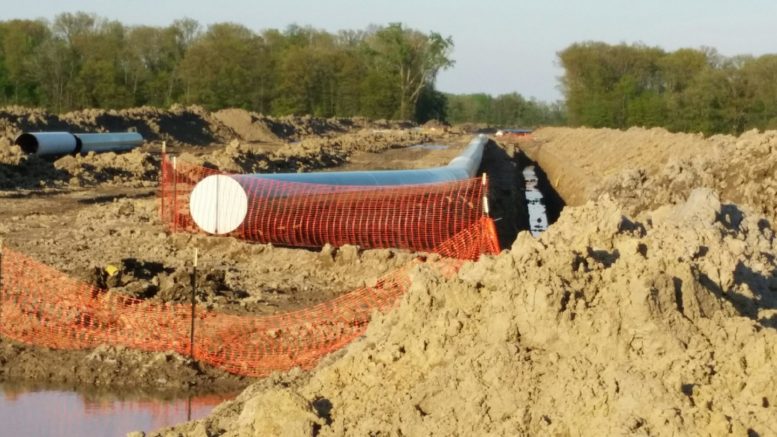By JAN LARSON McLAUGHLIN
BG Independent News
School districts throughout the region want to see pipelines pay their fair share of taxes as they stretch across Ohio. On Thursday evening, Bowling Green City School District joined the team.
“We are going to unite as one,” Bowling Green School Treasurer Cathy Schuller said of the effort to make sure pipelines pay according to their valuations.
The consortium of school districts will lobby to keep the original values of pipelines, Superintendent Francis Scruci said. It will cost Bowling Green schools $500 a year to join the consortium.
“That’s probably $500 well spent if it can save us the value of the pipeline,” Scruci said.
The school group is protesting efforts by pipeline companies to pay a portion of the taxes assigned to the businesses based on the value of the lines.
For Bowling Green City Schools, the concern is Rover Pipeline, which is protesting the amount of taxes it has to pay for its natural gas line buried through Wood County.
Last month, Rover paid about 50% of its original assessment to local entities. That is below the 56% amount the pipeline has appealed the state to accept. So according to Wood County Auditor Matt Oestreich, the pipeline still owes local entities at least 6%.
“It’s kind of in a holding pattern right now,” Oestreich said of the pipeline appeal to cut its taxes. “Sometimes these things go on for years.”
Following are the amounts paid by Rover pipeline to local school districts:
- Elmwood: $2,840,903
- Bowling Green: $1,956,159
- North Baltimore: $990,124
- Penta: $417,291
- McComb: $96,373
Local entities had been warned not to bank on the pipe dream of tax revenue predicted from the Rover Pipeline. But the promise of big money from Rover was thrilling for several entities – from libraries and parks to school districts desperate for revenue.
Then last fall, Energy Transfer, the parent company of Rover, filed an appeal of the tax amount set by the state.
According to Energy Transfer, the Ohio Department of Taxation’s valuation of the Rover Pipeline for property tax purposes was significantly higher than the amount reported in pre-construction estimates.
The assessment and the ultimate resolution will affect 18 counties that Rover runs through: Ashland, Belmont, Carroll, Crawford, Defiance, Fulton, Hancock, Harrison, Henry, Jefferson, Monroe, Noble, Richland, Seneca, Stark, Tuscarawas, Wayne and Wood.
But the Rover tax assessments remain on hold while the pipeline protests the amount.
The Rover pipeline consists of two side-by-side pipelines which travel through Bloom, Henry, Jackson, Milton, and Perry townships.
Earlier this year, Oestreich said the hesitancy by school districts and other entities to bank on the pipeline was reasonable.
The right to appeal is offered annually, Oestreich said.
“They can appeal next year, potentially they can do that every year,” he said.
Pipelines continue to pay local property taxes throughout a 30-year depreciation cycle. So each year of operation, the amount paid in taxes will decrease, finally bottoming out at 15 percent of the initial amount, Oestreich explained last year.
Much of the skepticism with Rover’s tax payments was due to the company’s exaggerated estimates of how much local entities would reap from the pipeline coming through the area.
Some of those estimates, made when trying to win support from local entities, went as high as $3 million a year for entities like Henry Township. However, that township actually got closer to $143,000 this year.
In 2015, when the initial promise was made by Energy Transfer, former Wood County Auditor Michael Sibbersen questioned the estimates. Current county auditor Oestreich shared those concerns about inaccurate estimates being given to township officials.
“They were throwing around some rather large numbers,” Oestreich said. “I don’t think they understood Ohio taxation at all.”
The Bowling Green district’s financial advisor, David Conley, from Rockmill Financial Inc., has also pointed out that the pipeline revenue is an uncertainty since the state sometimes takes that revenue from some districts to give to others that are struggling financially.
“They siphon it off and send it someplace else,” he said last year. “Lobbyists are being paid a lot of money to take money away from you.”





